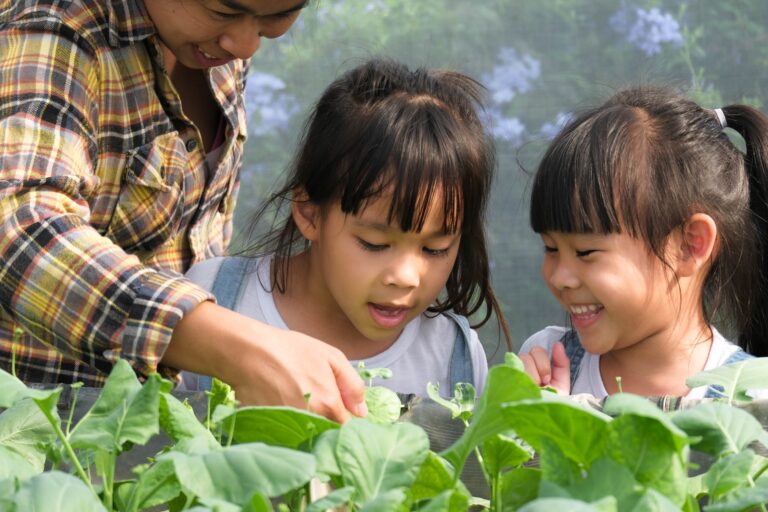Introduction to vegetable gardens in childcare centres
Vegetable gardens in childcare centres offer a multitude of educational opportunities, as children can learn about the life cycle of plants, the importance of proper nutrition, and the value of hard work and perseverance.
By integrating gardening activities into the childcare centre curriculum, educators can create a meaningful and stimulating learning experience that will have a lasting impact on the children’s lives.
In the following sections, we will delve into the numerous benefits of vegetable gardens in childcare centres, explore how they can support outdoor learning opportunities, and provide practical tips and resources for integrating a vegetable garden into your childcare centre.
The benefits of vegetable gardens in childcare centres
Encouraging healthy eating habits
One of the most significant benefits of having a vegetable garden in a childcare centre is the opportunity to teach children about the importance of healthy eating habits.
By growing their own fruits and vegetables, children are more likely to develop a preference for these nutritious foods and make healthier choices when it comes to their diets.
Gardening activities can also serve as a platform for discussing the nutritional value of various plants and the essential role that they play in maintaining overall health and well-being.
Enhancing cognitive development
Vegetable gardens in childcare centres can greatly contribute to children’s cognitive development.
Through hands-on gardening activities, children can develop their problem-solving skills, as they learn how to care for plants and respond to various challenges that may arise.
Additionally, gardening can help improve children’s fine motor skills, as they practice planting seeds, watering plants, and harvesting produce.
Fostering social and emotional development
Gardening activities can also play a crucial role in fostering children’s social and emotional development.
By working together in the garden, children learn how to communicate, collaborate, and support one another.
They also develop a sense of responsibility and accomplishment, as they witness the fruits of their labour grow and thrive.
How vegetable gardens support outdoor learning opportunities
Connecting with nature
In an increasingly technology-driven world, it is essential for children to have ample opportunities to connect with nature.
Vegetable gardens in childcare centres provide children with the chance to immerse themselves in the natural world, fostering a greater appreciation for the environment and the interconnectivity of all living things.
Supporting physical development
Gardening activities also support children’s physical development, as they engage in various tasks that require strength, balance, and coordination.
By participating in outdoor gardening activities, children can develop their gross motor skills and improve their overall physical fitness levels.
Enhancing sensory experiences
Vegetable gardens offer a wealth of sensory experiences for children, as they can explore various textures, colours, scents, and tastes.
By engaging in gardening activities, children can develop their sensory awareness and learn to appreciate the beauty and diversity of the natural world.
Integrating vegetable gardens into the childcare centre curriculum
Interdisciplinary learning opportunities
One of the key advantages of incorporating a vegetable garden into a childcare centre curriculum is the opportunity for interdisciplinary learning.
Gardening activities can be integrated into various subject areas, such as science, math, language arts, and social studies.
For example, children can learn about plant life cycles and ecosystems, practice measuring and counting skills, engage in creative writing and storytelling, and explore the cultural and historical significance of various plants.
Hands-on, experiential learning
Vegetable gardens provide children with the opportunity to engage in hands-on, experiential learning. By taking part in gardening activities, children can gain a deeper understanding of abstract concepts and develop their critical thinking skills.
This type of active learning is particularly effective for young children, as it allows them to explore and make meaning of the world around them through direct experience.
Responsive teaching and learning
By incorporating a vegetable garden into the childcare centre curriculum, educators can create a responsive teaching and learning environment that caters to the unique interests and needs of each child.
Gardening activities can be adapted to suit various learning styles, abilities, and developmental levels, ensuring that all children can participate and benefit from this engaging learning experience.
Teaching children valuable life skills through gardening
Responsibility and perseverance
Caring for a vegetable garden can teach children important life skills, such as responsibility and perseverance. As they tend to their plants, children learn to take ownership of their actions and appreciate the importance of consistent effort and hard work.
Patience and delayed gratification
Gardening also teaches children the value of patience and delayed gratification. By waiting for plants to grow and produce, children learn to appreciate the rewards that come from investing time and effort into a project.
Cultivating empathy and compassion
By nurturing and caring for living things, children can develop empathy and compassion. These essential social and emotional skills can have a lasting impact on their relationships and overall well-being.
Enhancing environmental awareness and sustainability practices
Understanding ecosystems and biodiversity
Vegetable gardens in childcare centres can serve as a platform for teaching children about ecosystems and biodiversity.
As they learn about the various plants, insects, and animals that inhabit the garden, children can develop a greater appreciation for the intricate web of life and the importance of maintaining balance in the natural world.
Developing sustainable habits
By participating in gardening activities, children can also learn about sustainable practices, such as composting, water conservation, and organic gardening techniques.
These valuable lessons can help children develop a strong environmental ethic and encourage them to adopt eco-friendly habits that will benefit the planet for years to come.
Encouraging environmental stewardship
Caring for a vegetable garden can instil a sense of environmental stewardship in children, as they learn to respect and protect the natural world.
By fostering this connection to the environment, childcare centres can help raise a generation of environmentally conscious citizens who are committed to preserving the planet for future generations.
Vegetable garden design ideas for childcare centres
Raised beds and container gardens
Raised beds and container gardens are practical and accessible options for childcare centres. They allow for better control of soil quality, drainage, and pest management, and can be easily adjusted to accommodate children’s varying heights and abilities.
Sensory gardens
A sensory garden can be an exciting addition to a childcare centre vegetable garden. Incorporating plants with various textures, scents, and colours can provide children with a rich sensory experience, as well as opportunities for exploration and discovery.
Theme gardens
Creating theme gardens, such as a pizza garden, butterfly garden, or alphabet garden, can add an element of fun and excitement to the childcare centre vegetable garden.
These themed gardens can also serve as a springboard for interdisciplinary learning activities and creative play.
Resources and support for childcare centres to establish vegetable gardens
Local gardening clubs and organizations
Local gardening clubs and organizations can be a valuable resource for childcare centres looking to establish a vegetable garden.
These groups can provide guidance, support, and volunteer assistance to help get the garden up and running.
Grants and funding opportunities
There are various grants and funding opportunities available for childcare centres wishing to implement a vegetable garden.
Researching local, regional, and national programs can help secure financial support for the project.
Online resources and networks
The internet is a treasure trove of information and resources for childcare centre vegetable gardens, including articles, videos, lesson plans, and forums.
Connecting with online networks and communities can provide valuable insights, advice, and inspiration.
Success stories: childcare centres with thriving vegetable gardens
The Edible Schoolyard Project
The Edible Schoolyard Project, founded by renowned chef Alice Waters, is a groundbreaking initiative that has successfully integrated vegetable gardens into the curricula of numerous schools and childcare centres.
This inspiring project demonstrates the transformative power of gardening in education, as it has enriched the lives of countless children and educators.
Little Green Thumbs
Little Green Thumbs is another notable success story, as this program has provided support and resources for over 500 childcare centres and schools to establish vegetable gardens.
Through their comprehensive approach, Little Green Thumbs has helped create meaningful and engaging learning experiences for children across North America.
Conclusion and next steps for implementing a vegetable garden in your childcare centre
Vegetable gardens in childcare centres offer a wealth of educational benefits and opportunities, as they provide children with a unique and engaging learning experience that fosters cognitive, physical, social, and emotional development.
By incorporating a vegetable garden into your childcare centre, you can create a dynamic and responsive learning environment that inspires curiosity, creativity, and a lifelong love of learning.
The journey to implementing a vegetable garden in your childcare centre begins with researching and planning.
Reach out to local gardening clubs and organizations for guidance and support, and explore funding opportunities to help bring your project to fruition.
With dedication and perseverance, you can cultivate a thriving vegetable garden that will enrich the lives of the children in your care and foster a greater appreciation for the natural world.
When designing your garden, consider incorporating raised beds, sensory gardens, and theme gardens to provide children with a rich and diverse learning experience.
Remember to adapt gardening activities to suit the unique needs and interests of each child, and to foster a sense of responsibility and ownership in their gardening efforts.
By implementing a vegetable garden in your childcare centre, you can cultivate a love of learning and a deeper connection to the environment in the children in your care.
With the right resources, support, and dedication, you can create a thriving garden that will enhance the educational experience and well-being of your young learners.












